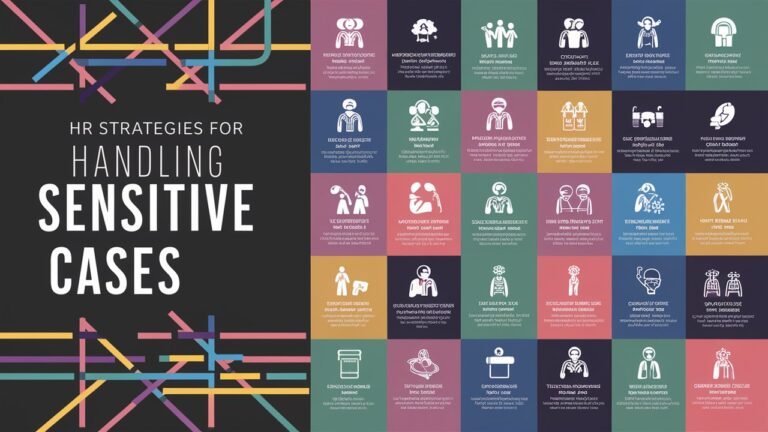Navigating sensitive employee situations is one of the most challenging aspects of human resources. These cases, which can range from serious illness and personal loss to workplace conflicts and harassment claims, require a delicate balance of empathy, professionalism, and strict adherence to legal standards. How an HR department manages these moments can significantly impact employee morale, trust, and the overall company culture.
A well-handled sensitive issue can reinforce an employee’s sense of value and security within the organization. Conversely, a misstep can lead to feelings of alienation, decreased productivity, and potential legal complications. This guide outlines key HR strategies for managing these complex situations effectively, ensuring that both the employee and the organization are supported throughout the process.
Foundational Principles for Handling Sensitive Issues
Before diving into specific strategies, it’s important to establish a set of core principles that should guide every interaction. These principles create a framework for trust and respect.
Uphold Strict Confidentiality
Confidentiality is the cornerstone of handling sensitive employee information. Employees must feel secure that their private matters will not become office gossip. Breaches of confidentiality can destroy trust not only with the individual involved but also across the entire organization. Establish clear protocols for storing sensitive information and limit access to only those who absolutely need to know.
Lead with Empathy and Compassion
Employees facing difficult personal circumstances are often in a vulnerable state. Approaching them with genuine empathy and compassion is crucial. This means actively listening to their concerns, acknowledging their feelings, and showing that you care about their well-being. A compassionate approach can make a significant difference in how an employee experiences a challenging time and how they view their employer.
Ensure Consistency and Fairness
While every situation is unique, it’s vital to apply policies and procedures consistently across the organization. Fairness prevents perceptions of favoritism or discrimination. Document every step of the process to ensure that decisions are based on established company policies and legal requirements, rather than personal bias.
Key Strategies for Managing Sensitive Cases
With these principles in mind, here are specific strategies HR professionals can implement to navigate sensitive employee issues effectively.
1. Establish Clear Communication Channels
Open and clear communication is essential. Inform the employee about the steps you will take, who will be involved, and what they can expect. Provide a single point of contact within HR to streamline communication and avoid confusion. This contact should be a trusted resource who can answer questions and provide updates. Regular, proactive check-ins can also help the employee feel supported rather than forgotten.
2. Understand Your Legal Obligations
HR professionals must have a firm grasp of relevant employment laws, such as the Family and Medical Leave Act (FMLA), the Americans with Disabilities Act (ADA), and Title VII of the Civil Rights Act. These laws dictate requirements for leave, accommodations, and protection against discrimination and harassment. Misunderstanding these obligations can lead to serious legal consequences for the company. When an issue involves external factors, such as an injury sustained outside of work, it’s wise to be prepared. For instance, knowing when to direct an employee to resources like an auto accident lawyer in Tulsa, OK, can be just as important as knowing internal policies.
3. Document Everything Meticulously
Thorough documentation is your best defense against potential disputes. Keep detailed records of all conversations, decisions, and actions taken. This includes dates, times, attendees, and a summary of what was discussed. This documentation should be objective and factual, avoiding personal opinions or assumptions. Securely store these records to maintain confidentiality.
4. Offer Support and Resources
A key role for HR is to connect employees with available support systems. This can include:
Employee Assistance Programs (EAPs): These programs offer confidential counseling and resources for a wide range of personal and work-related issues.
Flexible Work Arrangements: Offering options like remote work, flexible hours, or a reduced schedule can provide much-needed flexibility.
Leave Options: Clearly explain all available leave options, including paid time off, sick leave, FMLA, and any company-specific policies.
Proactively offering these resources shows that the company is invested in the employee’s well-being and is willing to provide tangible support.
5. Train Managers to Be First Responders
Managers are often the first to become aware of an employee’s sensitive situation. It’s crucial to train them on how to respond appropriately. This training should cover the importance of confidentiality, how to show empathy, and when to escalate the issue to HR. Managers should understand their role is to be supportive without trying to solve the problem themselves or overstepping into HR’s domain.
Creating a Supportive Workplace Culture
Effectively handling sensitive cases is not just about following a process; it’s about fostering a culture where employees feel safe and supported. When your team knows they will be treated with respect and compassion during difficult times, it builds loyalty and strengthens the entire organization. By implementing these HR strategies, you can navigate even the most challenging situations with professionalism and care, ensuring positive outcomes for both your employees and your company.
